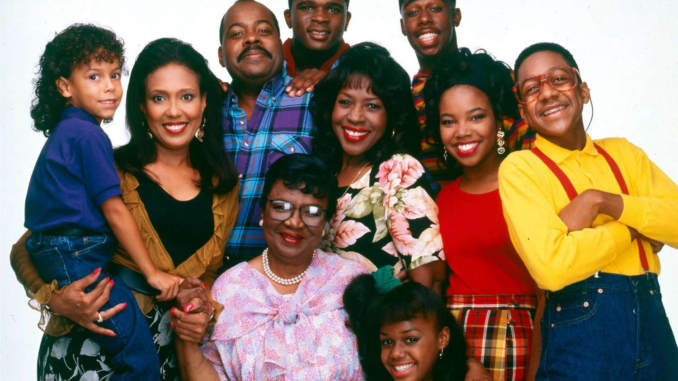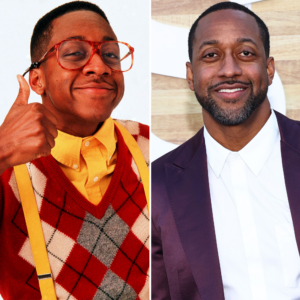
Jaleel White, the actor behind the beloved character Steve Urkel from Family Matters, has recently shared his perspective on why the iconic show isn’t always considered one of the best Black TV shows. In a recent interview, White pointed out a recurring issue in how Black shows are ranked or celebrated in the media. He boldly stated, “If it’s not a hood story, it’s not a Black story.” This provocative statement sheds light on the broader debate about representation in Black television and why shows like Family Matters, despite their cultural significance, often get overlooked when it comes to discussions about the best Black TV shows.
But why exactly does Jaleel White think Family Matters doesn’t fit into the usual narrative of Black TV greatness? In this article, we’ll unpack White’s comments and explore the reasons behind this, diving into how Black representation in television has evolved, and why certain stories continue to dominate the conversation. From The Cosby Show to Insecure, what truly defines the “best” Black TV shows?
Jaleel White’s Bold Take: “If It’s Not a Hood Story, It’s Not a Black Story”
In his statement, Jaleel White critiques the tendency to associate Black television shows with certain stereotypes. These stereotypes often involve a focus on urban, “hood” stories that reflect a particular socio-economic experience. White argues that shows like Family Matters, which centered on a middle-class Black family in Chicago, often get sidelined because they don’t conform to these typical narratives.
The Perception of Black TV Shows
Many Black TV shows that have been deemed “classics” focus on stories tied to the urban experience or struggles faced by marginalized communities. Shows like The Cosby Show, The Jeffersons, and Good Times have earned their spots in the conversation about the best Black TV shows. However, these shows often reflect a specific version of Black life that may not represent the diversity of the African American experience.
Family Matters did not fall into this category. While it was groundbreaking in many ways, including being one of the first sitcoms to portray a nerdy Black protagonist in Steve Urkel, it was a show about an upper-middle-class family in Chicago. Because it didn’t heavily focus on the “struggles” often associated with Black television, Family Matters was, and continues to be, somewhat sidelined in discussions about Black excellence on TV.
Why Is ‘Family Matters’ Overlooked in the Best Black Shows Debate?
Although Family Matters is often remembered as a quintessential 90s sitcom, it has been largely overlooked in conversations about the “best” Black TV shows. This is in part because it didn’t follow the traditional formula of a “Black” story in the eyes of many critics and viewers.
A Middle-Class Black Family Was a Revolutionary Concept
The Winslow family, the heart of Family Matters, represented a middle-class Black family navigating everyday challenges. The show didn’t rely on stereotypical depictions of hardship or crime to tell its story. Instead, it focused on humor, family dynamics, and personal growth. The show’s portrayal of Black middle-class life was groundbreaking, but it didn’t fit the conventional narrative that many people expected from a “Black” show.
Not a ‘Hood’ Story, Not Seen as a Black Story?
In the broader context of television, Black shows that focus on overcoming adversity, often tied to inner-city life, have been more likely to receive critical acclaim. Shows like The Wire and Empire have dominated discussions of Black TV because they focus on real-world struggles that resonate with many viewers. In contrast, Family Matters wasn’t about poverty, crime, or gang life. Instead, it focused on a Black family with strong values, humor, and love for one another. This approach might have seemed less “authentically Black” to some critics or audiences, leading to its exclusion from these top rankings.

Jaleel White and the Complexity of Black Representation in Media
Jaleel White’s comments bring to light a deeper issue within the entertainment industry: the narrow confines of how Black culture is represented. Historically, Black television has been dominated by stories of struggle, survival, and hardship. This is important and valid, but it often overlooks the diversity of Black experiences.
The Push for More Nuanced Black Stories
In recent years, there has been a push for more nuanced, multi-dimensional representations of Black life. Shows like Black-ish, Insecure, and Atlanta have made strides in portraying Black experiences in a variety of ways. These shows feature not only the challenges faced by African Americans but also their joys, accomplishments, and everyday lives.
Breaking Free from the “Hood Story” Mold
Jaleel White’s critique reflects the need for more varied portrayals of Black people on television. The notion that only “hood stories” can be considered truly Black stories is limiting and outdated. While these narratives are important, there is room for a broader range of stories that reflect the diversity of the Black experience.
The Evolution of Black Television: A New Era of Representation
Television has come a long way when it comes to representing African American experiences. In the 70s and 80s, shows like The Cosby Show helped redefine what it meant to be Black on television. By focusing on a successful Black family, The Cosby Show broke new ground. However, even The Cosby Show was still limited in some ways, particularly in how it portrayed class and urban life.
The Rise of More Diverse Black TV Shows
Today, we see an even broader spectrum of Black television that includes stories of all kinds, from the inner-city to the upper-middle-class. This is a positive development, as it allows for more realistic portrayals of Black life, free from the constraints of stereotypical depictions.
Jaleel White’s Role in This Evolution
As an actor on Family Matters, Jaleel White was a part of this evolution. His portrayal of Steve Urkel as a nerdy Black teenager shattered stereotypes and introduced a new kind of representation for Black youth on television. While Family Matters may not have always received the recognition it deserved, it undoubtedly played a role in changing the narrative around Black characters on TV.
The Legacy of ‘Family Matters’: An Underappreciated Gem
Despite being excluded from many discussions of the best Black TV shows, Family Matters remains an enduring part of television history. The show helped solidify the role of Black actors in mainstream sitcoms and was a crucial step in diversifying the representation of Black families on TV.
The Show’s Cultural Impact
While the Winslow family’s story may not have been rooted in the “hood,” Family Matters still influenced countless viewers and made an indelible mark on the cultural landscape. Steve Urkel, in particular, became an icon, challenging perceptions of what Black characters could be. His quirky, lovable persona broke the mold and helped redefine the possibilities for Black characters on television.
Conclusion: Re-Evaluating Black TV Show Rankings
Jaleel White’s statement sheds light on an ongoing issue within the television industry: the narrow lens through which Black TV shows are often viewed. While Family Matters may not fit the mold of a “hood story,” it has undoubtedly had a lasting impact on television and Black representation. By challenging the notion that only certain types of stories are truly “Black,” White invites us to reconsider how we define greatness in Black television.
The evolution of Black representation in television is still ongoing, and we must continue to embrace a broader range of stories, from the urban struggles to the more subtle, everyday victories of Black families. Shows like Family Matters deserve recognition as part of this evolving narrative, and we should all work to ensure that Black stories are appreciated in all their diversity.
FAQs
1. Why does Jaleel White think ‘Family Matters’ isn’t considered one of the best Black shows? Jaleel White believes that Family Matters wasn’t seen as one of the best Black shows because it didn’t fit the traditional mold of a “Black story,” which often involves urban or “hood” experiences.
2. What is the significance of the “hood story” in Black television? “Hood stories” often focus on struggles in lower-income or urban communities. These types of shows are typically seen as more authentic or relatable to certain audiences, which has led to them dominating discussions of Black TV excellence.
3. How has Black representation in television evolved over the years? Black representation in TV has become more diverse, with shows like Black-ish, Insecure, and Atlanta offering nuanced portrayals of the Black experience, moving beyond stereotypes and highlighting a variety of stories.
4. What was Jaleel White’s contribution to Black television? Jaleel White played a groundbreaking role as Steve Urkel in Family Matters, offering a nerdy, Black character that defied stereotypes, and contributing to the diversification of Black representation on television.
5. Is Family Matters an important part of Black TV history? Yes, despite not always being included in discussions of the best Black shows, Family Matters played a significant role in changing the landscape of Black television by offering a different perspective on Black family life and representation.
